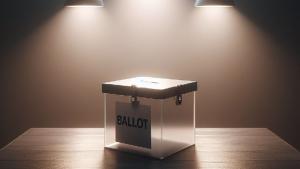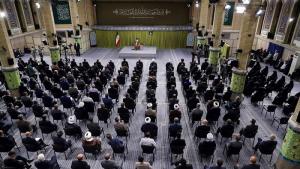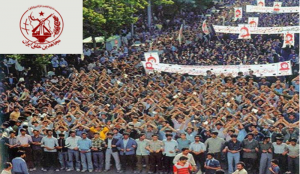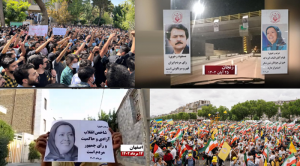(video)Uprisings Loom: Iran's Regime Confronts Escalating PMOI Influence

As the regime’s parliamentary election day in March approaches,the regime’s efforts to engineer the results and deceive the public become more evident.The regime officials are warning about the elections becoming a “referendum against the regime”.

On Jan 9, regime supreme leader Ali Khamenei warned that speaking about the futility of elections is “the strategic policy of the enemies of the revolution.” Afterwards, the regime intensified its propaganda efforts against the (MEK),as the main enemy and threat.

On Jan 8, the editor of the state-run Etemad newspaper, Elias Hazrati, emphasized the necessity of unity among all ruling factions to confront the PMOI. He said, “ The PMOI believes that they could overthrow the regime within two days with an organized militia."
On Jan. 9, regime supreme leader Ali Khamenei warned that speaking about the futility of elections is “the strategic policy of the enemies of the revolution.”
The situation has reached a point that regime officials are warning about the elections becoming a “referendum against the regime” and they warn their rivals about the possibility of another nationwide uprising against the regime.
On January 9, regime supreme leader Ali Khamenei warned that speaking about the futility of elections is “the strategic policy of the enemies of the revolution.” Afterwards, the regime intensified its propaganda efforts against the People’s Mojahedin Organization of Iran (PMOI/MEK), which it considers its main enemy and threat.
On January 12, 2024, the Friday prayer leader of Qom, Mohammad Saeedi, spent his entire sermon to the PMOI and their methods of infiltrating and attracting the youth among the people. He warned, “Today, our enemies seek to drive a wedge between the people and the ballot boxes.”
Ahmad Khatami, a member of the Guardian Council, highlighted the main reason for Khamenei’s fear of the chaos of the electoral spectacle. He warned on December 30, “Those who instigated turmoil want to achieve what they couldn’t achieve in the unrest through the March 1st elections! They wish to say that this regime is not a democratic system, they want a referendum against the regime.”
In a meeting with the leaders of various factions, Iranian regime president Ebrahim Raisi said, “What unites political parties, groups, and factions is the preservation of the regime.” He then referred to the common enemy and added, “Know that the unrest of the past year showed no mercy towards any political party, movement, or elements within the regime.”
On January 8, Tte editor-in-chief of the state-run Etemad newspaper , Elias Hazrati, emphasized the necessity of unity among all ruling factions to confront the PMOI. He said, “When the PMOI believed that they could overthrow the regime within two days with an organized militia, [regime founder Ruhollah] Khomeini once again resorted to the people and formed a 36-million-strong intelligence structure. This formed the basis for the country’s decision-making process and placed popular participation at the highest levels in advancing affairs.”
Hazrati further referred to the uprisings of 2019 and 2022 and added, “Special events have taken place in the country since 2019 and 2021, and meaningful and purposeful participation in Iran has decreased. Additionally, specific social events occurred in 2022 that raised significant concerns and magnified the importance of the 2024 elections in Iran. Despite the shortcomings and unkindness that our friends had witnessed, some of the reformist parties stepped forward and advised the people and various groups to participate in the elections.”
The state broadcaster IRIB, through its orchestrated debates with figures from all defeated factions, aims to protect the regime against the threat of PMOI and organized resistance, even at the cost of admitting to the regime’s failures.
While the regime has spent astronomical sums to publish over 500 books and hundreds of fake films, TV series, and documentaries against the PMOI, Adel Haddad, former Speaker of the Assembly of Experts, stepped forward and said, “Lack of awareness of the crimes [PMOI], which have been to the shortcomings of the information and cultural institutions over the years, has led to a biased judgment of the people towards the PMOI.”
By referring to the so-called trial against PMOI members, he added, “Conducting trials alongside the presentation of documents and evidence will raise public awareness.”
Throughout this extensive propaganda campaign, which includes everyone from Khamenei himself to all factions of the regime, the regime tries to instill fear of the PMOI as a common enemy.
Khamenei’s goal in engineering the elections is to “purify” the regime and consolidate power to deal with its crises, primarily the threat of uprisings. However, it is now becoming apparent that he is facing the prospect of other uprisings; he is resorting to desperate measures to preserve the regime against the PMOI and uprisings.
In official settings, Iranian authorities persist in using the term “hypocrites” to refer to the Mujahedin-e-Khalq organization (MEK/PMOI). However, there is a noticeable shift in public discourse.
Across social media, news commentary, conferences, media reporting, and films intended for domestic audiences, the term “Mujahedin-e Khalq” is increasingly, and some would argue, unprecedentedly, being employed with equal frequency.
While the regime’s stance on an organization it has considered a primary adversary for the past 44 years remains unchanged, the shift is observable within Iranian society.
Four decades of political suppression, social discrimination, economic corruption, and violent suppression of numerous uprisings have driven people’s inclination towards a name that the ruling establishment has always tied with a fierce fight against the state.
Therefore, public search for information, both offline and online about the MEK counteracts the regime’s four-decade-long propaganda, necessitating a change in the regime’s media strategy.
Despite the Iranian regime’s record of harsh suppression and systematic vilification against the organization inside Iran, the Judiciary finds it necessary to conduct formal court proceedings against the leaders of the MEK.
A weekly trial takes place in Tehran every Tuesday, where state officials discuss what they label as the MEK’s crimes, present fabricated documentaries, and disseminate propaganda material to all state-controlled media outlets, irrespective of their political leanings.
A straightforward search in the Persian language reveals that the term Mujahedin-e-Khalq often equals the word Monafeqin (Arabic for hypocrites) in terms of online results in state media outlets.
The regime has also taken its aggressive stance against the MEK beyond its borders, with officials explicitly stating their demand for the expulsion or, at the very least, the restriction of organization activities in discussions with foreign delegations.
Over the years, the Iranian regime has actively manipulated and distorted content related to the National Council of Resistance of Iran the National Council of Resistance of Iran – (NCRI), or the MEK across all social networks, websites, and even Wikipedia pages through its cyber army.
On January 7, The Times exposed how the Iranian regime manipulates information on Wikipedia to tarnish the image of the MEK. The Times also reported, “Online misinformation is also a key tool for the regime. In 2019, Open Democracy revealed key differences in the reporting of Iranian affairs on Persian Wikipedia compared to its English counterpart.”
“Now manipulation appears to have been carried out on the English-language Wikipedia. Many of the Iran edits concerned a page for the People’s Mujahedin of Iran, also known as the Mujahedin-e-Khalq (MEK), an exiled opposition group that backs the overthrow of the Islamic Republic,” Times adds. However, inside the country, these activities continue with even greater intensity.
On Saturday, January 13, a session was held in Tehran involving several experts and film consultants to discuss the movie Zed, Persian for the antagonist. This film, among hundreds produced by intelligence agencies, aims to present a distorted and terrorist image of the MEK by narrating the history and activities of the organization in the 1980s.
Interestingly, according to a report by the state-run site “IBNA,” the invited experts themselves acknowledge that this film is a tailored propaganda piece intended to tarnish the image of the MEK and is filled with distortions of events.
Specifically, Mohammad Rahmani, introduced as a cinema history researcher by IBNA, states that the conversations in the film of MEK members are presented in a mafia-like manner, depicting elderly individuals, while in reality, the Mujahedin were young in the 1980s, and their communication was based on Islamic principles. According to him, the MEK never confessed under torture, contrary to what the film portrays.
A website specializing in disseminating derogatory content and offensive propaganda against the organization, Raheno has recently released a report disparaging the 28th telethon conducted by Simay-e Azadi, a 24-hour satellite network associated with the Iranian Resistance.
The report strongly expresses outrage against the notion that the financial independence of the Iranian Resistance and its media is thereby acknowledged by Iranian society.
What stands out is the apparent obsession of the article’s author or authors with denigrating the MEK, overshadowing a crucial point. Despite the 20 years since the fall of the former Iraqi government and the consistent implementation of hostile policies by Western countries against the Iranian Resistance over the past six decades, readers are prompted to question the credibility of the claim that the MEK is somehow linked to the former Iraqi government, Saudi Arabia, Israel, the United States, or France.
Considering the diversity of these countries, their conflicting strategic interests, and their evolving policies towards the Iranian regime, along with electoral priorities that shift with each administration, it raises the question of how the MEK has managed to uphold a consistent strategy and ideology.
However, the sheer volume of lies has resulted in numerous conflicting narratives, leaving the audience confused about their authenticity. Despite this, what has most significantly weakened the impact of the regime’s 44 years of falsehoods against the MEK is the exposure of the regime’s atrocities on one hand, and on the other, the organization’s enduring resistance and its consistent portrayal as being the regime’s main adversary.
To subscribe weekly Newsletter of NCRI, please use this link. https://bit.ly/3SMgEla
Shahin Gobadi
NCRI
+33 6 61 65 32 31
email us here
On Jan.12, 2024, the Friday prayer leader of Qom, spent his entire sermon to the PMOI and their methods of and attracting the youth among the people.
Legal Disclaimer:
EIN Presswire provides this news content "as is" without warranty of any kind. We do not accept any responsibility or liability for the accuracy, content, images, videos, licenses, completeness, legality, or reliability of the information contained in this article. If you have any complaints or copyright issues related to this article, kindly contact the author above.


